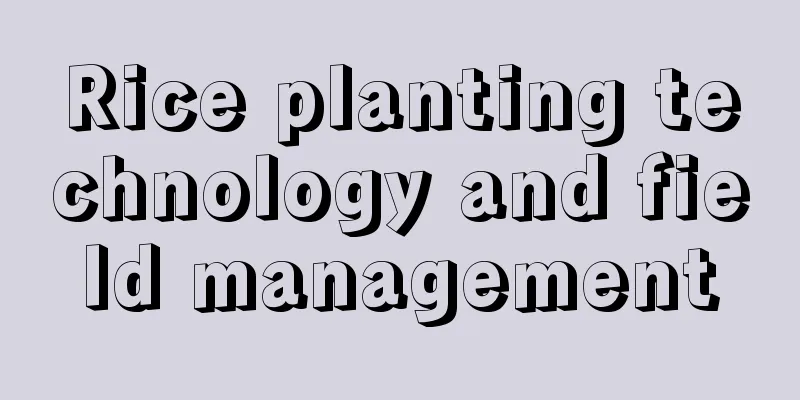Rice planting technology and field management

|
As a vital food crop in my country, rice is widely grown across the country and is distributed in all regions. With the remarkable progress of agricultural science and technology in China in recent years, rice cultivation technology has also been comprehensively improved. Let’s learn about rice planting techniques and field management together. 1. Scientific seed selection The first step to increase rice yield is seed selection. When selecting rice seeds, the adaptability and quality of the seeds must be considered to ensure that they can achieve their maximum potential under specific soil and climatic conditions. Seed selection should be based on two key points: ensuring that seed quality meets planting standards to support normal growth and improve planting benefits. Consider the soil and climate conditions of the planting area and choose the most suitable rice seeds to increase yield. 2. Seed treatment Reasonable seed treatment technology is essential to promote rice growth and increase yield. The main goals of seed treatment are to improve yield and quality, including: Germination test: To ensure that the rice seeds can grow normally in the area, the germination rate must reach more than 85%. Drying and disinfection: Kill pathogens and increase germination rate through exposure to the sun and soaking in chemicals. 3. Field management Field management is the key to improving rice planting efficiency and yield. Choose the best management techniques according to the rice variety and environment to control soil moisture and oxygen content. Develop a weeding plan and select the right technology to provide good growing conditions for rice. 4. Fertilization and irrigation According to the growth status of rice, supplement fertilizer reasonably and optimize the fertilization plan. Develop scientific irrigation plans, taking into account cultivation techniques and rice variety characteristics, and avoid excessive irrigation. 5. Pest and disease control Use insect repellents reasonably, choose liquid medicines suitable for different pests and diseases, avoid using highly toxic agents, and replace agents regularly to prevent pests from developing drug resistance. In summary, my country has a wide range of rice-growing areas, providing people with a rich source of food. In view of the differences in soil and climate in different regions, it is necessary to choose appropriate cultivation techniques according to local conditions to promote the healthy growth of rice and increase yield.
|
<<: Suitable for leaders' office green plants
>>: When do Phalaenopsis orchids bloom?
Recommend
Where does the seven-color flower grow? Where does it grow?
Seven-color flower growth habits The seven-color ...
How often should you water your fruit trees?
How often should you water your fruit trees? Ther...
Cultivation methods and maintenance matters of old lucky tree stumps
How to grow a lucky tree into an old stump The sc...
What month is suitable for planting cherry trees?
When to plant cherry trees The planting method of...
How to water flowers with aspirin
Can aspirin be used to water flowers? Aspirin con...
Cultivation methods and precautions of chrysanthemum
1. Maintenance methods 1. Flower pot selection: L...
Is Gardenia poisonous?
1. Is it poisonous? No, this flower has a fragran...
The most fragrant flowers for indoor potted plants
1. Jasmine There are many varieties of jasmine, m...
What kind of soil do roses need to grow and how to disinfect the soil
1. What kind of soil is needed for planting It li...
The Flower Language and Legend of Christmas Rose
Flower Language Hesitation and contradiction. If ...
How to Make Magnolias Bloom for Christmas
Flowering period of Magnolia It usually takes abo...
Cuttings of these flowers in summer will root quickly and grow wildly
Rubber Tree 1. Choose a sturdy rubber tree paper ...
Mosquito repellent grass cutting propagation method and precautions
How to breed mosquito repellent grass The origin ...
How to propagate Chlorophytum comosum
Steps to reproduction Select strains Now let'...
How often should I water the purple bamboo plum?
How often should I water the purple bamboo plum? ...









